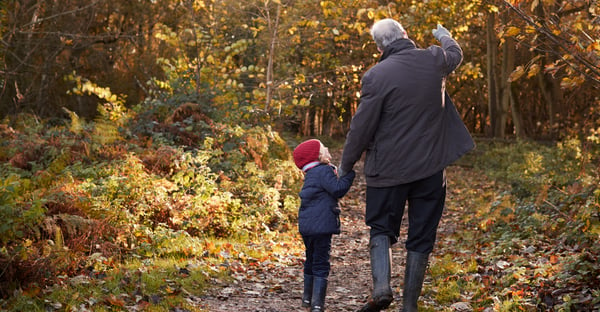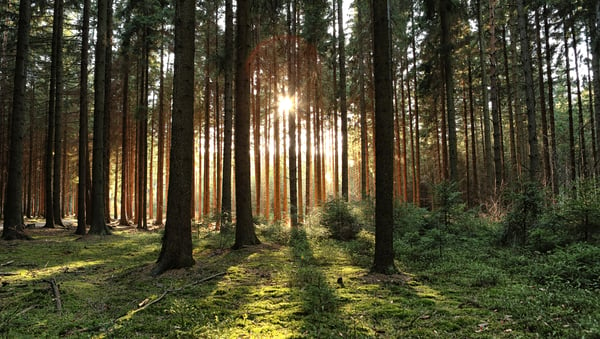If managing your woodlands is a labor of love, it’s hard to envision a time when you won’t be able to care for your property the way that you do now. But being a good steward of your property includes looking ahead and planning for that future.
You may want to bequeath your land to your heirs, donate it to an organization that you support, sell it, or choose some combination of these options. You may decide to pass it on after you die, or begin transferring the land to a new owner during your lifetime.

Keeping it in the Family
Do you want to bequeath your land to your children or other relatives? There’s real satisfaction in knowing your forest property will remain in your family. But owning and managing land takes time and money, so you need to be sure the next generation is willing and able to take on that responsibility.
Ideally, you will have talked with your family members over the years about your long-term wishes for your forest and what they envision their role in its management will be. If you haven’t had those conversations yet, it’s time to start.

There’s a lot to consider when leaving your land to family members:
- Do your children love the land as you do? Do they understand the time and financial commitment it takes to properly manage the land, pay taxes, etc.?
- Do you want to include stepchildren or in-laws in your legacy?
- What’s the best way to pass on your land? Leave the entire property to all heirs jointly? Put it in a trust? Divide it up and give each heir a separate portion? If there will be joint ownership, who will make the decisions about managing the land?
- Have some of your children worked on the land with you, while others have been less involved? Do you want to recognize in some way the sweat equity contributions that some of your heirs have made?
- If some of your children are not interested in owning the woodlands, do you want to compensate them in another way?
- When you die, will your family have the financial resources they need to pay estate taxes and other expenses?
You’ll find useful information on legacy planning in this article from Woodland magazine.
Donating Your Forest Land
You might consider donating all of your property or some portion of it to a cause that’s important to you. It’s a great way of supporting and recognizing the work that the organization does.
There are several aspects of land donation that you’ll need to address:
- Is the organization that you want to donate to willing and able to accept land?
- What will they do with the land once you’ve transferred ownership? (Is it important to you that they conserve and manage it, or are you okay with the sale of the land funding their programs?)
- Do you want to donate all of your land or a portion of it?
- What is the value of the land that you want to donate?
- Are you planning to claim a charitable tax deduction for your donation? Are you up to date on the latest tax laws? Do you know the limitations on land deductions?
- What are the financial and tax implications if you donate the land before you die? After you die? Can you donate the land now and continue to use it until you die?

If you’re looking for a worthy donee, consider the American Forest Foundation and its new legacy land gift program. When you donate property to AFF, you are ensuring that your forest land will be permanently protected and well managed long term. In addition, you’ll be providing AFF with the resources it requires to carry out its important advocacy and educational work on behalf of family forest owners.
Once you’ve decided to make a donation through the legacy land gift program, AFF will work with a forestry services firm and local land trusts to determine the best strategy to ensure your long-term wishes for the property are carried out. For more information visit www.aff.planmygift.org/ or email Beth Riley at briley@forestfoundation.org.
Selling Your Forest Land
Even if you’d like to hold on to your woodland during your lifetime, you may find yourself in a financial situation where you think you have to sell all or part of them. Maybe you need money for retirement or to pay for long-term care or medical expenses. Perhaps the taxes on the land have gotten so high that you can’t afford to pay them.
Before you post that for sale sign, why not see if there are other ways that you can get the cash that you need from your land? Harvesting timber or offering hunting leases might generate sufficient income. You might also qualify for government programs that offer financial assistance for landowners in need.

If taxes are too high, explore the possibility of signing a conservation easement agreement with a local land trust or government agency. In return for lower taxes – both property and estate – you agree never to develop your land. This agreement is binding on all future landowners as well.
If you must liquidate your forest land assets, you can protect your land during your lifetime and afterwards by donating its conservation easement to a land trust or similar organization. Be aware, however, that if development rights are restricted, the value of the land (and thus your sales price) may go down.
You could also ask local land trusts and other forest owners in your area who share your land management philosophy if they know of any potential buyers who would care for the land as you have.
Seeking Advice
No matter how you’ve decided to pass down your land - bequeathing, donating and/or selling it – it’s essential that you understand all of the legal, financial and tax implications that could impact you and your family. To get you started, the American Forest Foundation has a whole section on its My Land Plan website devoted to planning for the future of your land.
Be sure to discuss your long-term goals for the land with your family members and with your financial planner, tax advisor and/or lawyer. Together you can determine the best approach for structuring the legacy, donation or sales transaction so that you and your family get the maximum benefit and that your land is protected and managed well even after you are gone.
*This post was written by Mary Lou Jay, a regular contributor to WoodsCamp blog and AFF's WoodLand Magazine.


We want to hear from you.